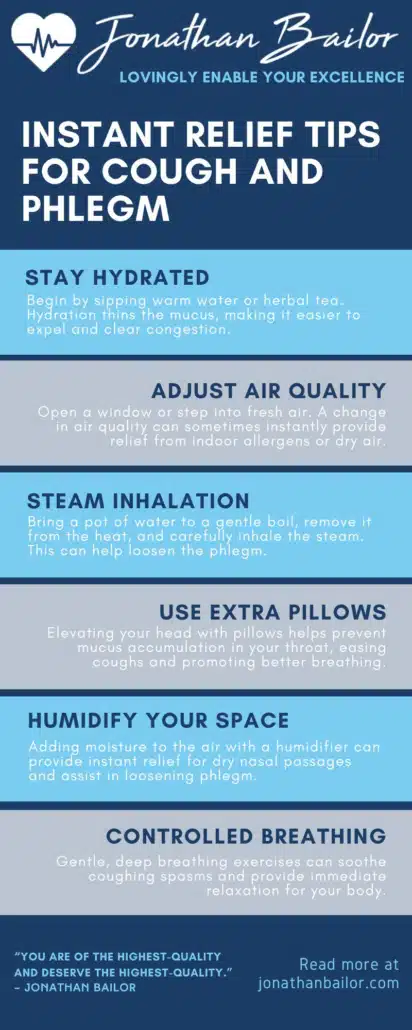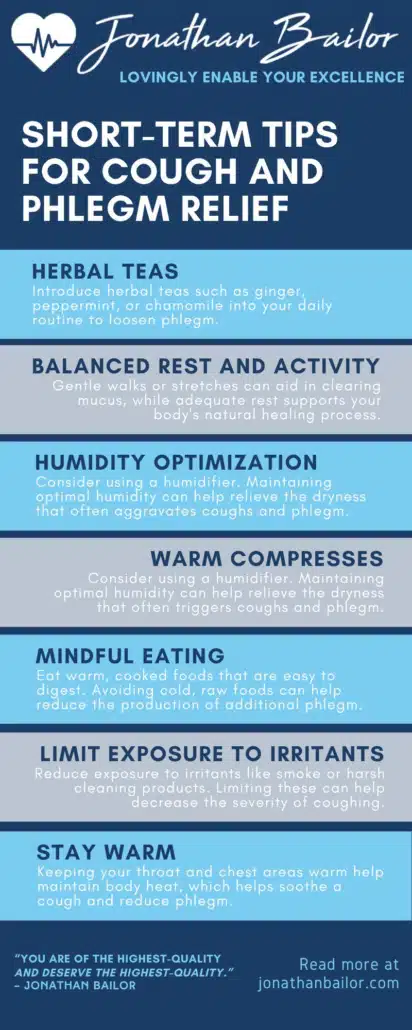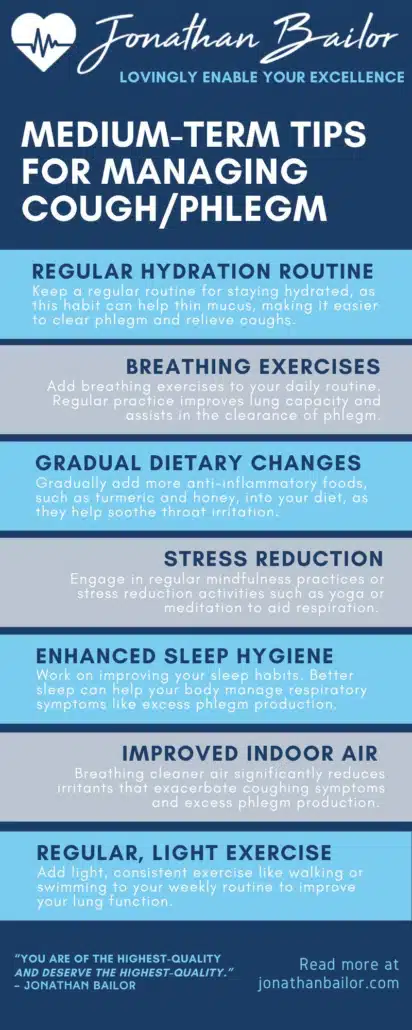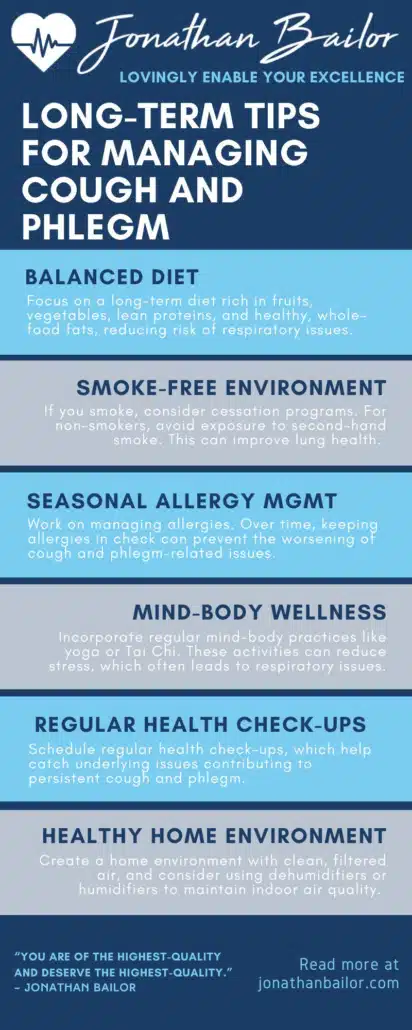26 Natural Remedies for Coughing Up Phlegm at Every Stage of Life
Here are the best natural remedies for coughing up phlegm at every stage of life you may encounter! As the seasons of life unfold, so do various health challenges, including the ever-so-common coughing up phlegm. Yet, regardless of age or stage in life, timeless, natural methods exist to soothe these discomforts. Imagine having a treasure trove of gentle yet effective remedies at your fingertips—therapies that have stood the test of time and can be effortlessly integrated into daily life.
Need more coughing or phlegm help? Read our 31 Evidence-Based Treatments for Managing Chronic Cough Without Medication and Embracing 23 Natural Remedies to Clear Phlegm and Ease Cough guides next!
This cough and phlegm journey with Jonathan Bailor into natural healing is not just about temporary relief; it’s about embracing practices that harmonize with your body’s rhythm at every stage of life. These methods, rooted in nature’s wisdom, offer more than just physical ease; they bring a sense of empowerment and well-being.
What you’ll find here are not just tips but keys to unlocking a more comfortable, phlegm-free life. The beauty of these natural methods is their universal appeal—they are as relevant and effective for the young at heart as they are for the seasoned soul.
So, as you explore these natural pathways to alleviate cough and phlegm, remember, you’re not just reading an article; you’re stepping into a realm of holistic health that respects and nurtures your body through every season of life. Feel free to share these insights with friends and family, for they deserve the comfort and wellness of nature’s healing touch.
Instant Relief: Immediate Actions for Cough and Phlegm Alleviation
When dealing with the discomfort of coughing up phlegm, sometimes immediate actions can provide the quickest relief. Here are some effective, immediate changes you can make to ease your symptoms right now:
1. Stay Hydrated
Begin by sipping warm water or herbal tea. Hydration thins the mucus, making it easier to expel. This simple act can provide instant comfort for an irritated throat and help clear congestion.
2. Adjust Your Environment
Open a window or step into fresh air if possible. Sometimes, a change in air quality can immediately soothe your respiratory system and provide relief from indoor allergens or dry air.
3. Steam Inhalation
Bring a pot of water to a gentle boil, remove it from the heat, and carefully inhale the steam. This can help moisten your airways and loosen phlegm, offering immediate relief. Remember to maintain a safe distance to avoid burns.
4. Use Extra Pillows
If you’re resting or plan on sleeping, prop yourself up with a few extra pillows. Elevating your head helps prevent mucus accumulation in your throat, easing coughs and promoting more comfortable breathing.
5. Humidify Your Space
If you have a humidifier, turn it on. Adding moisture to the air can provide instant relief for dry, irritated respiratory passages and assist in loosening phlegm.
6. Practice Controlled Breathing
Try gentle, deep breathing exercises. This can help soothe coughing spasms and provide immediate relaxation to your body, relieving discomfort from persistent coughing.
Each of these steps offers a pathway to immediate relief, helping you navigate through the discomfort of cough and phlegm with simple yet effective remedies at your fingertips.

Feeling Better Is Priceless, That's Why We Don't Put A Price On It!
“It’s Like A Free and Medically Valid Version of Noom and Weight Watchers Online”
~ Dr. Doctor Matthew Oleshiak, MD
Click the 'LEARN MORE' button below for free lifetime access to the fast fix program developed by Jonathan and top Ivy League Medical Doctors
LEARN MOREP.S. It's not a free trial. It's not part of the program for free. The entire program is free, forever, for real! No credit card needed.
Gentle Shifts: Short-term Strategies for Cough and Phlegm Relief
When addressing cough and phlegm, adopting short-term changes over a few days can significantly impact your comfort and recovery. Here are several approaches to consider for this period:
1. Herbal Teas
Introduce herbal teas such as ginger, peppermint, or chamomile into your daily routine. These teas are known for their soothing properties and can help reduce throat irritation and loosen phlegm over a couple of days.
2. Balanced Rest and Activity
Aim for a balanced mix of rest and light activity. Gentle walks or stretches can help improve circulation and aid in clearing mucus, while adequate rest supports your body’s natural healing process.
3. Humidity Optimization
If you’re in a particularly dry environment, consider using a humidifier consistently over the next few days. Maintaining optimal humidity can help alleviate the dryness that often aggravates coughs and phlegm.
4. Warm Compresses
Apply warm compresses to your throat and chest. The warmth can help soothe irritation in your respiratory tract and assist in loosening phlegm, which can be particularly comforting before bedtime.
5. Mindful Eating
Pay attention to your diet, focusing on warm, cooked foods that are easy to digest. Avoiding cold, raw foods can help reduce the production of additional phlegm and ease digestion.
6. Limit Exposure to Irritants
Reduce exposure to irritants like smoke, strong perfumes, or harsh cleaning products. Limiting these can help decrease the severity of coughing and irritation over a few days.
7. Stay Warm
Ensure you keep your body warm, especially the throat and chest areas. Wearing scarves or layers can help maintain body heat, which is beneficial for soothing a cough and reducing phlegm.
Each of these changes, implemented over a few days, can contribute to a more comfortable and quicker recovery, guiding you gently toward better respiratory health.

Progressive Adjustments: Medium-term Approaches for Managing Cough and Phlegm
In the journey of managing cough and phlegm, certain changes over the span of weeks can be instrumental in promoting long-lasting relief and prevention. Here are some medium-term strategies to consider:
1. Consistent Hydration Routine
Establish a consistent routine for staying hydrated throughout the day. Over the weeks, this habit can help maintain the thinning of mucus, making it easier to clear phlegm and alleviate cough.
2. Regular Breathing Exercises
Incorporate breathing exercises into your daily routine. Regular practice of techniques such as diaphragmatic breathing can strengthen your respiratory muscles, improve lung capacity, and aid in more effective clearance of phlegm.
3. Gradual Dietary Adjustments
Gradually incorporate more anti-inflammatory foods, such as turmeric, ginger, and honey, into your diet. Regularly consuming these foods can help reduce throat irritation and support overall respiratory health.
4. Enhanced Sleep Hygiene
Work on improving your sleep environment and habits. Quality sleep is crucial for immune function and recovery; over the course of several weeks, better sleep can help your body more effectively manage and reduce respiratory symptoms.
5. Moderate Indoor Air Quality
If you live in a polluted or dusty area, consider investing in an air purifier and maintaining it regularly. Consistently breathing cleaner air has a cumulative effect on your respiratory system, significantly reducing irritants that exacerbate cough and phlegm.
6. Mindfulness and Stress Reduction
Engage in regular mindfulness practices or stress reduction activities such as yoga or meditation. Regular practice over weeks can reduce stress-induced inflammation in the body, aiding in respiratory health.
7. Regular Light Exercise
Incorporate light, consistent exercise like walking or swimming into your weekly routine. This gentle, regular physical activity can improve overall lung function and help manage respiratory issues over time.
Implementing these strategies over several weeks can lead to meaningful improvements in managing cough and phlegm, paving the way for a healthier respiratory system and overall well-being.

Sustained Harmony: Long-term Strategies for Cough and Phlegm Wellness
Adopting long-term changes can profoundly impact how your body deals with coughs and phlegm, promoting enduring respiratory health. Here are some valuable strategies to integrate over the months:
1. Build a Balanced Diet
Focus on a long-term diet rich in fruits, vegetables, lean proteins, and healthy, whole-food fats. This balanced approach ensures a steady supply of essential nutrients, boosts your immune system, and reduces the likelihood of persistent respiratory issues.
2. Create a Smoke-Free Environment
If you smoke, consider cessation programs. For non-smokers, avoid exposure to second-hand smoke. Over months, living in a smoke-free environment can significantly improve lung health and reduce respiratory irritations.
3. Seasonal Allergy Management
If you’re prone to allergies, work with a healthcare provider to manage them effectively. Over time, keeping allergies in check can prevent the worsening of cough and phlegm-related issues.
4. Mind-Body Wellness Practices
Incorporate regular mind-body practices like yoga or Tai Chi. These activities, practiced consistently, can reduce stress, which often contributes to chronic respiratory issues.
5. Regular Health Check-ups
Schedule and maintain regular health check-ups. Periodic assessments can help catch any underlying issues contributing to persistent cough and phlegm, allowing for early intervention.
6. Foster a Healthy Home Environment
Invest in creating a home environment with clean, filtered air, and consider using dehumidifiers or humidifiers as needed to maintain optimal indoor air quality. Over the long term, this can significantly reduce irritants that trigger respiratory issues.
Implementing these changes over months can lead to a significant improvement in respiratory health, helping to manage cough and phlegm more effectively and enhancing your overall quality of life.

Essential Insights: FAQ on Coughing and Phlegm
Navigating the often perplexing world of coughs and phlegm can raise many questions. Here are answers to some frequently asked questions to help you understand and manage these common symptoms:
Q1: Why does the body produce phlegm, and what causes coughing?
Phlegm is a natural response of the respiratory system to irritation, inflammation, or infection. It helps trap and remove irritants like dust, pollen, or pathogens. Coughing is a reflex action to clear the airways of the phlegm, ensuring unobstructed breathing. While sometimes inconvenient, it’s an essential defense mechanism of the body.
Q2: Are all coughs productive of phlegm?
Coughs can be either productive (producing phlegm) or non-productive (dry cough). A productive cough helps clear mucus from the respiratory tract, while a dry cough may be due to irritation or inflammation in the throat or airways. Understanding the type of cough can guide the most appropriate management strategies.
Q3: Can diet affect cough and phlegm?
Yes, diet can influence cough and phlegm. Foods high in dairy and sugar might increase phlegm production for some people. A diet rich in fruits, vegetables, and hydration can help manage and reduce phlegm. Additionally, spicy or acidic foods may irritate the throat, exacerbating the cough.
Q4: What are some natural ways to soothe a cough and clear phlegm?
Natural remedies include staying hydrated, inhaling steam, using humidifiers, and practicing controlled breathing exercises. Herbal teas, like ginger and honey, can soothe the throat. These methods can provide relief by thinning mucus, reducing irritation, and aiding in the expulsion of phlegm.
Q5: When should medical advice be sought for a cough or phlegm?
It’s advisable to seek medical advice if a cough persists for more than a couple of weeks, is accompanied by a high fever, produces blood-tinged or discolored phlegm, or leads to breathing difficulties. These could be signs of a more serious underlying condition and warrant professional evaluation.
Q6: What conditions promote coughing and phlegm?
Conditions characterized by coughing and excess mucus production include chronic lung disease, chronic obstructive pulmonary disease (COPD), lung infection, viral infections like the common cold, lower respiratory tract infections like pneumonia, cystic fibrosis, bacterial infections, acute bronchitis, lung cancer, and postnasal drip.
Understanding these aspects of coughs and phlegm can empower you to manage these symptoms more effectively, leading to greater comfort and well-being. Remember, while these answers provide guidance, consulting with a healthcare professional for persistent or severe symptoms is always recommended.
Closing Thoughts: Sharing the Path to Respiratory Wellness
As we conclude our exploration into managing cough and phlegm, it’s clear that embracing natural, practical methods can lead to significant relief. These insights offer more than just individual comfort; they open doors to shared well-being.
If this journey has illuminated your path to better respiratory health, consider passing on this beacon of knowledge. Share these insights with friends and family through social media or a thoughtful email because in sharing, we not only care, we connect. Here’s to each breath being easier, and to the health and comfort we can bring to those around us.
Feeling Better Is Priceless, That's Why We Don't Put A Price On It!
“It’s Like A Free and Medically Valid Version of Noom and Weight Watchers Online”
~ Dr. Doctor Matthew Oleshiak, MD
Click the 'LEARN MORE' button below for free lifetime access to the fast fix program developed by Jonathan and top Ivy League Medical Doctors
LEARN MOREP.S. It's not a free trial. It's not part of the program for free. The entire program is free, forever, for real! No credit card needed.




